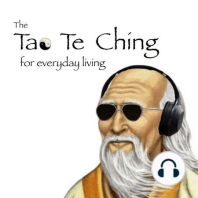23 min listen

Tao Te Ching Verse 22: Using the Law of Balance
Tao Te Ching Verse 22: Using the Law of Balance
ratings:
Length:
34 minutes
Released:
Feb 21, 2020
Format:
Podcast episode
Description
Tao Te Ching Verse 22email the podcast: DailyTaoLife@gmail.comtranslated by Wing-Tsit ChanTo yield is to be preserved whole. To be bent is to become straight. To be empty is to be full. To be worn out is to be renewed. To have little is to possess. To have plenty is to be perplexed.Therefore the sage embraces the One And becomes the model of the world.He does not justify himself; therefore he becomes prominent. He does not boast of himself; therefore he is given credit. He does not brag; therefore he can endure for long.It is precisely because he does not compete that the world cannot compete with him.Is the ancient saying, "To yield is to be preserved whole," empty words? Truly he will be preserved and (prominence and credit) will come to him.Photo by Gustavo Torres on UnsplashLet’s consider how we can apply the principle of Using the Law of Balance in this verse today.We’ve kind of gotten comfortable with this idea of using the law of balance - basically, things always balance out and reach equilibrium. And, being aware of this, we can use this principle to not only bring ourselves into balance more quickly, but we can actively practice balance, too.With this in mind, I’d like us to take a look at the main point of Verse 22: To yield is to preserve whole. In other words, non-competition results in maintaining balance. So let’s look at some of the ways we compete from day to day.We compete with others and we compete with ourselves, don’t we?In completing with others, I can find myself always making mental notes - is this person legit? Is this person better than me? Am I better than that person? Maybe it’s not so obvious - perhaps our little competitions are more subtle:At home, is my news more important than my significant other’s news about the day? Do I need to express my feelings and make sure they’re heard first? Do I insist that my significant other pays attention to me?At work: Do I actually listen to what others are proposing or saying, or am I preparing counterarguments? Or, am I thinking of novel ways to relate and show that I’m a good team player by coming up with more elaborate ways to say, uh huh. Yes, I understand. I’m guilty of this.With friends - do we make fun of others? Do we talk about others? Do I bring these subjects up or do they? When they bring others up, do I engage or allow the conversation to pass?If those are some ways I compete with others, let’s consider how I compete with myself. What are my plans for the day? How important is it that I accomplish these things? What happens if I don't accomplish them? How will I feel? Will I be less worthy, less disciplined, or just not a good person if I don’t accomplish my goals? What if I don’t want any goals and am content to sit there? Doing nothing? Do I beat myself up for not wanting to do anything?I think the main takeaway for this verse is for us to become aware of when we contend with either others or ourselves. And we see that every time we contend, we place some sort of resistance in our paths to growth. Lao Tzu urges us to yield, to accept what is, both within ourselves and without, so that we may keep close to center and therefore stay balanced.
Released:
Feb 21, 2020
Format:
Podcast episode
Titles in the series (80)
Tao Te Ching Verse 7: Abandoning Identity by The Tao Te Ching for Everyday Living